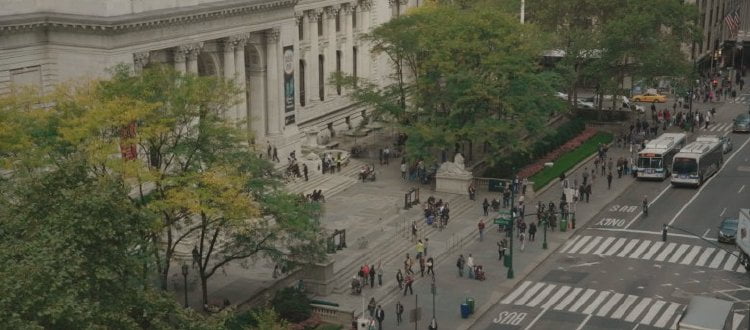Ex Libris: The New York Public Library

Uber-documentary filmmaker Frederick Wiseman is famous for his in-depth examinations of institutions, people and places with such masterworks of cinema verite as “National Gallery (2014),” “At Berkeley (2013),” “Boxing Gym (2010)” and about 40 other films spanning 50 years. His latest takes us into the heart of “Ex Libris: The New York Public Library.”
Laura's Review: B
New York's public library system gets the Frederick Wiseman treatment in his latest, "Ex Libris: The New York Public Library." The 197 minute film is classic Wiseman, presenting multiple facets of his subject, segueing from one to the next with street signs, establishing shots and empty interior spaces. Wiseman has a knack for standing back and capturing institutions as living, breathing organisms, considering aspects most might not even think about. And so we see an architect reject the idea of a library as a repository of books, something Wiseman makes very evident here. There are social programs, like job fairs and housing and Internet assistance. The disabled are serviced with braille classes, book recordings and theater for the deaf. The arts are embraced not only via author series (Elvis Costello and Patty Smith appear) and book clubs, but through concerts, poetry readings and gallery displays. We see various styles of architecture and interior design as Wiseman visits various branches, highlighting the Schomberg Center for Research in Black Culture. He peaks behind the scenes, where media is distributed, photos classified and employees meet to discuss budgets, outreach and homeless patrons. Wiseman's documentaries also include miniature portraits of the people in his viewfinder. In one meeting, the participants seem more focused on their own relevance than the matter at hand. Others are more idea oriented. His camera finds and settles on various faces in audiences, revealing things about them. "Ex Libris," though, with its vast scope may not be the ideal Wiseman to begin with. It is not as consistently engaging as his last, "Jackson Heights," one of his very best, but his fans are in for yet another treat. Grade:
Robin's Review: B
Frederick Wiseman is not exactly known for his pared-down and lean films about life. The man with a documentarian’s eye, especially over the later years of his long career, has brought us into the heart of his subjects and, through many layers, shows us the nuts and bolts of life. “Ex Libris” opens us to the heart and soul of one of the world’s greatest social institutions. Oddly, for me, I did not get the usual film buff rush after watching “Ex Libris” and I wondered why. The film is similar in structure – no titles for who is talking, no narration or explanation by the filmmaker, the roaming, all-seeing camera – and all these elements are there. And, there is no doubt that the NYPL is an interesting subject. Then, I figured it out as I went through me notes. The New York Public Library provides a treasure trove of information and service to the public and “Ex Libris” shows us how the far reaching institution does it all: maintaining a vast library of printed material, artworks for the public to see, introducing the internet to the average New Yorker, classrooms for kids and a delivery system that reminds of an airport luggage handling operation. But, all these things require talk, lots of talk. The life of the NYPL relies on funding, funding from the public sector, funding from the private sector and all of this funding means fund raising. This means lots and lots of talking about funding and a substantial portion of “Ex Libris” is about just that. I think I learned a lot about how to raise money but it does not have same rapt interest that you have as we watch a library researcher on the phone patiently telling a library customer that unicorns are not real. Talk is the lifeblood of the NYPL as it copes with all of the obstacles that it faces to keep going well into the 21st Century. It is not as compelling to watch, though, as the other Wiseman films mentioned above. It does give you a regained respect for a great institution that is integral to our society.

